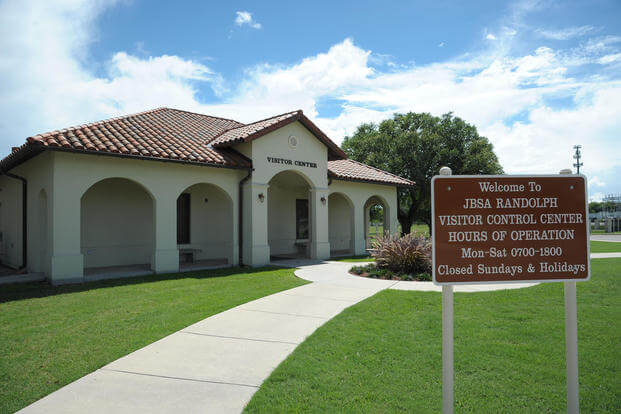Medical barracks at Joint Base San Antonio, Texas, are still being treated for a bacteria that can cause pneumonia after it was detected in pipes nearly a month ago, forcing 150 patients and staff to be relocated across the base.
Employees and residents at Liberty Barracks, where military patients at the nearby medical center live, have not been allowed back in the building since Legionella was discovered Sept. 30.
"We're waiting for the latest round of test results before making any decisions on moving residents or staff back into Liberty Barracks," Rob Strain, a spokesman for the 502nd Air Base Wing, told Military.com on Wednesday. "The water is being flushed regularly so that it isn't sitting stagnant, but it isn't being used by residents or staff."
Read Next: Airman Becomes First US Woman to Attend Royal Thai Air Force's Air Command and Staff College
About 100 residents and 50 staff from the Behavioral Health Clinic, located inside the barracks, have not been allowed back inside since Sept. 30 and had to be relocated.
Liberty Barracks, a 216,000-square-foot facility capable of housing nearly 400 patients, opened in 2012, designed to provide a place to stay for service members while they receive treatment at the base's medical facilities.
Those residents may also be especially susceptible to catching Legionnaires' disease, a severe type of pneumonia caused by coming into contact with Legionella bacteria, since they are already undergoing medical care. It spreads through microscopic droplets of water and can be transmitted through drinking water, swimming pools and cooling towers in air conditioning systems, according to the Mayo Clinic.
Those who smoke, are 50 years or older, or have weakened immune systems are most susceptible to the illness. Base officials said in a press release last month that there have been "no known cases of Legionnaires disease or other legionella-based infections among residents or staff at Liberty Barracks."
Strain told Military.com on Wednesday that there have been no confirmed cases of Legionnaires' disease or Legionella-related infections among residents or staff at Liberty Barracks, "but we are continuing to monitor those who may have been exposed to the facility's water systems for any clinical indications of infection."
Since Legionella was detected last month, the building has been treated with a "super-chlorination process," Strain told Military.com. But subsequent testing for the bacteria showed it may still be present.
"Following the treatment, an initial round of follow-up testing was conducted," Strain said in an emailed statement. "During that process, a positive result for the legionella bacteria was returned from an administrative room on the fifth floor. We are continuing additional confirmatory testing to determine if the test was a false positive or if we need to take next steps in a treatment process to ensure facility safety."
Discovery of Legionella at Joint Base San Antonio is the latest housing and contamination incident among the services.
Last week, the Navy said water from the aircraft carrier USS Abraham Lincoln's bilges, a type of drainage system, leaked runoff into drinking water on the ship and was responsible for the "odor and cloudy appearance" that sailors observed last month.
Additionally, in late September, the Navy told Military.com that 10 sailors had health issues that might be related to a fuel leak that contaminated water aboard the aircraft carrier USS Nimitz.
In August, service members stationed at Kunsan Air Base, South Korea, began posting dozens of pictures online showing widespread moldy patches in hallways and images of thermostats reading anywhere from 87 to 90 degrees due to broken air conditioning. Base officials created a task force in September to address the issues.
Also in August, the Army announced that more than 1,700 soldiers at Fort Bragg, North Carolina, would be evacuated after an inspection found 12 buildings were unlivable due to mold and air conditioning issues. The relocation effort was completed recently, the base said.
This is not the first time Liberty Barracks has detected Legionella. Last year, the building was evacuated after the bacteria was found in the building's plumbing, according to a press release.
Editor's note: This story has been updated to include a response from Joint Base San Antonio saying there have been no confirmed Legionnaires' infections among barracks residents.
-- Thomas Novelly can be reached at thomas.novelly@military.com. Follow him on Twitter @TomNovelly.
Related: Legionella Found in Pipes at Medical Barracks at Joint Base San Antonio, Forcing Relocations










